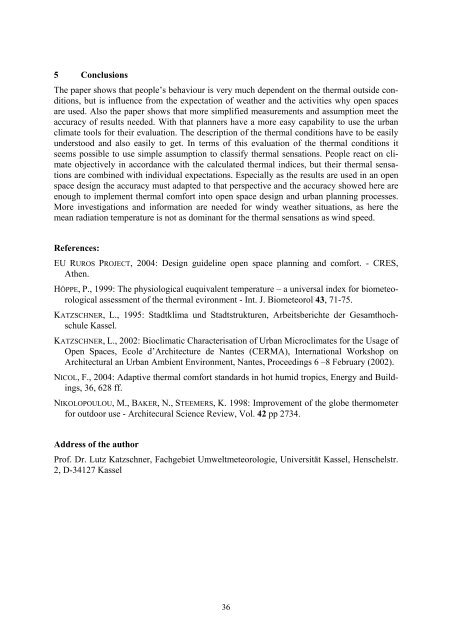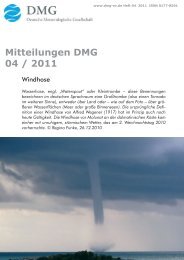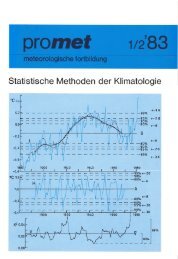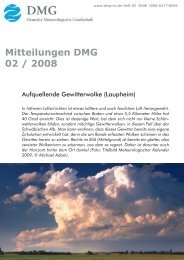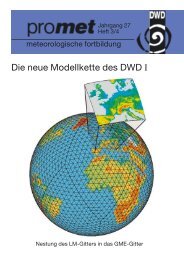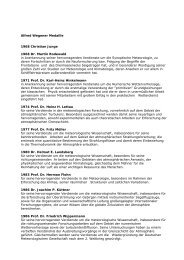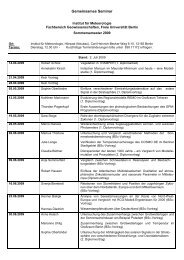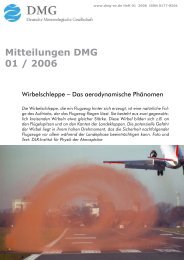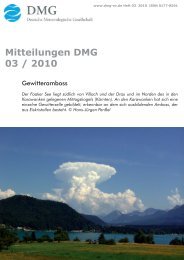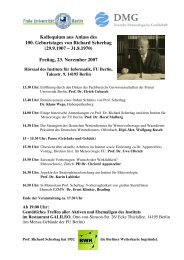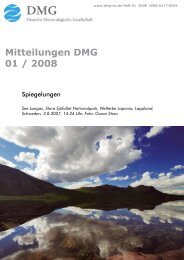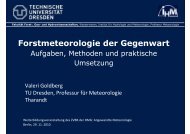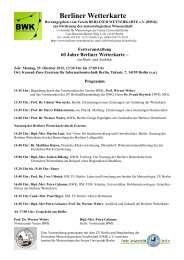- Seite 1 und 2: Berichte des Meteorologischen Insti
- Seite 3 und 4: INHALTSVERZEICHNIS Seite Vorwort 6
- Seite 5 und 6: T. Rötzer Modellierung der klimabe
- Seite 7 und 8: Vergleich der Hitzewellen 2003 und
- Seite 9 und 10: 3. Ergebnisse und Schlussfolgerunge
- Seite 11 und 12: welcher der Faktoren für die Auswi
- Seite 13 und 14: austausch zwischen dem Körper des
- Seite 15 und 16: Umgebungsbedingungen in Hinsicht au
- Seite 17 und 18: 4 Schlussfolgerungen Die Experten d
- Seite 19 und 20: Die thermischen Umgebungsbedingunge
- Seite 21 und 22: 3 Thermische Behaglichkeit im globa
- Seite 23 und 24: tungsgemäß eine Zunahme der Wärm
- Seite 25 und 26: Bioclimate and Mortality in Vienna
- Seite 27 und 28: Fig. 1: Temporal development of PET
- Seite 29 und 30: Table 1: Mortality values for days
- Seite 31 und 32: Microclimatic thermal comfort analy
- Seite 33 und 34: Tab. 1: Thermal evaluation from int
- Seite 35: measurements. Even if there was onl
- Seite 39 und 40: - KLIMES KAS-1 (Projektleiter: Prof
- Seite 41 und 42: zu finden - falls es sie gibt. Aggr
- Seite 43 und 44: Die Relevanz der Innenraumverhältn
- Seite 45 und 46: Außenwand [W/m² K] Außenfenster
- Seite 47 und 48: Schlußfolgerungen und Ausblick Das
- Seite 49 und 50: stehen. So wie für Pflanzen, Tiere
- Seite 51 und 52: 2.3 Evaluation der H- und T-Aspekte
- Seite 53 und 54: Zeitpunkt in die Statistik einginge
- Seite 55 und 56: Zusammenhang zwischen meteorologisc
- Seite 57 und 58: gensburg zur Verfügung gestellt. V
- Seite 59 und 60: stoffe NO2 und PM10 bei einer Verz
- Seite 61 und 62: Feinstaubkonzentrationen (PM2.5) in
- Seite 63 und 64: staub können diese kleinen Partike
- Seite 65 und 66: man auch beachten, dass Benzol im W
- Seite 67 und 68: Das thermische Empfinden von Touris
- Seite 69 und 70: Umgebungstemperatur ein. Es wurde s
- Seite 71 und 72: Absolute Werte 150 120 90 60 30 0 -
- Seite 73 und 74: Entwicklung einer Bewertungsmethodi
- Seite 75 und 76: c) Analyse von klimatischen und bio
- Seite 77 und 78: keit sowie Kälte/Hitzestress ist e
- Seite 79 und 80: MATZARAKIS, A., KARATARAKIS, N. SAR
- Seite 81 und 82: geeignet, weil die technischen Vora
- Seite 83 und 84: Abb. 1: Häufigkeitsverteilung der
- Seite 85 und 86: lysen durchgeführt und die Ergebni
- Seite 87 und 88:
KUNTIKUM: Klimatrends und nachhalti
- Seite 89 und 90:
Produkte • Kooperations-Netzwerk
- Seite 91 und 92:
i- und multilateralen Beziehungen i
- Seite 93 und 94:
MATZARAKIS, A., DE FREITAS, C., SCO
- Seite 95 und 96:
Als herausragendes Sturmereignis in
- Seite 97 und 98:
d) Waldbauliche Konzepte, d.h. Stra
- Seite 99 und 100:
6. Arbeitsprogramm Die aus den Ziel
- Seite 101 und 102:
Dämpfung von Baumreaktionen auf Wi
- Seite 103 und 104:
ERIKSSON, M., A. POUTTU, H. ROININE
- Seite 105 und 106:
1. Introduction The development of
- Seite 107 und 108:
WIDLOWSKY et al., 2003, and for spr
- Seite 109 und 110:
Besides the quantitative changes, i
- Seite 111 und 112:
Coupling soil water and tree transp
- Seite 113 und 114:
z - vertical coordinate; Kq, - turb
- Seite 115 und 116:
only to a short increase of water i
- Seite 117 und 118:
Der Einfluß von Randeffekten auf d
- Seite 119 und 120:
dieser Randeffekt noch deutlich, w
- Seite 121 und 122:
mm). Im Falle der Esche wurde diese
- Seite 123 und 124:
The Influence of Climate Change and
- Seite 125 und 126:
Analysis of trends in climate recor
- Seite 127 und 128:
GOLDBERG, V. & C. BERNHOFER, 2006:
- Seite 129 und 130:
1 Einleitung Im Rahmen des Projekte
- Seite 131 und 132:
Dübener Heide identifiziert werden
- Seite 133 und 134:
5 Schlussfolgerungen Im Testbestand
- Seite 135 und 136:
Kohlenstoffflüsse eines Kiefernwal
- Seite 137 und 138:
Die Limitierung des pflanzenverfüg
- Seite 139 und 140:
Abb. 3: Verläufe bestandesklimatis
- Seite 141 und 142:
Glasscherben als Ursache von Waldbr
- Seite 143 und 144:
Abb. 2: Infrarotaufnahme der von de
- Seite 145 und 146:
maximale Temperatur im Lichtfleck [
- Seite 147 und 148:
Dynamik der Austauschprozesse von C
- Seite 149 und 150:
20 cm und zwei Radim3a (SMM, Tschec
- Seite 151 und 152:
Der Tagesgang der CO2-Konzentration
- Seite 153 und 154:
Konzept zur Erstellung neuer hochau
- Seite 155 und 156:
Hilfe von Modellrechnungen mit dem
- Seite 157 und 158:
efinden, so würden bei einer reine
- Seite 159 und 160:
MUES, V., 2000: GIS-gestützte Regi
- Seite 161 und 162:
2 Modellbeschreibung Das physiologi
- Seite 163 und 164:
Tab. 1: Charakteristik des analysie
- Seite 165 und 166:
Betrachtet man die über die sechs
- Seite 167 und 168:
Prognose des Diasporentransports in
- Seite 169 und 170:
In den Arbeiten von (KAIMAL et al.,
- Seite 171 und 172:
auch turbulente Strukturen wie Böe
- Seite 173 und 174:
Bestimmung der turbulenten CO2- und
- Seite 175 und 176:
2.2 Messsysteme Der Messturm befind
- Seite 177 und 178:
Abb. 3: Fehlwerte in (%) der vertik
- Seite 179 und 180:
WEBB, E. K., 1982:. On the correcti
- Seite 181 und 182:
Abb. 1: Luftaufnahme des Messstando
- Seite 183 und 184:
Abb. 3: Tagesmittel von: (a) Luftte
- Seite 185 und 186:
sungen, notwendig. Hier ist eine Ve
- Seite 187 und 188:
messungen des Bodenwassergehaltes m
- Seite 189 und 190:
0,9. Allerdings zeigten sich zwisch
- Seite 191 und 192:
Bodenwassergehalt in Vol.% 50 45 40
- Seite 193 und 194:
Agrarmeteorologische Aspekte beim A
- Seite 195 und 196:
Die Abbildungen 4a und 4b weisen eb
- Seite 197 und 198:
Anzahl Fälle 100 90 80 70 60 50 40
- Seite 199 und 200:
Untersuchungen zur Spritzwasserdyna
- Seite 201 und 202:
mit dem Pulverfarbstoff Vitasyn ein
- Seite 203 und 204:
Gesamtzahl Tropfen 1000000 100000 1
- Seite 205 und 206:
Modifikationen eines eindimensional
- Seite 207 und 208:
physikalisch-mathematischen Modelli
- Seite 209 und 210:
Abb. 4: Vergleich der berechneten u
- Seite 211 und 212:
FRIDAY, J.B., AND J.H. FOWNES, 2001
- Seite 213 und 214:
lang der Mosel unterteilt und umfas
- Seite 215 und 216:
98600 98800 99000 99200 99400 99600
- Seite 217 und 218:
schwankten die Differenzen zwischen
- Seite 219 und 220:
schen Gesellschaft findet man von 1
- Seite 221 und 222:
schungsanstalt für Wald, Schnee un
- Seite 223 und 224:
DEFILA, C., B. CLOT, 2005: Phytophe
- Seite 225 und 226:
Abb. 1: Verteilung der Baumobstflä
- Seite 227 und 228:
Abb. 3: Trends unterschiedlicher Ph
- Seite 229 und 230:
Phänologische Modelle als Grundlag
- Seite 231 und 232:
nauso wie die Basistemperatur TBf e
- Seite 233 und 234:
Modellen der Fall, wo sehr viele Mo
- Seite 235 und 236:
RÖTZER, T., GROTE, R., PRETZSCH, H
- Seite 237 und 238:
- 16:9 Breitbild-Aufnahmen, - Dreh-
- Seite 239 und 240:
noinformationen (Abb. 3). Es steht
- Seite 241 und 242:
Tab. 1: Correlation coefficients be
- Seite 243 und 244:
Tab. 7: Well-balanced value by regr
- Seite 245 und 246:
tenbank der ZAMG in anschaulicher W
- Seite 247 und 248:
In den Flashmaps zeigen, wie sich i
- Seite 249 und 250:
Berichte des Meteorologischen Insti


